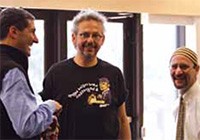
On March 18, Karla Goldman, Sol Drachler Professor of Social Work and director of the Jewish Communal Leadership Program, welcomed Rabbi Nathan Martin, associate director, U-M Hillel, to moderate a panel discussion, “Food with a Conscience: Ethical and Jewish Perspectives on the Business of What We Eat.”
Karla Goldman introduced the panelists—Seth Goldman, co-founder and TeaEO, Honest Tea; and Ari Weinzweig, co-owner and founding partner, Zingerman’s Community of Businesses—as “Two of the nation’s most innovative businesses when it comes to communal responsibility: high-quality products, a humane work environment, and a desire to make a difference that goes beyond the bottom line.”
The panel sought to address questions of Jewish identity, business ethics, and corporate responsibility. Can businesses navigate the shoals of social responsibility and make a profit? How might Jewish values inform the behavior of producers and consumers? Goldman and Weinzweig considered how selling and eating “good” food impacts local and global communities.
Rabbi Nathan Martin posed a variety of talking points on mission-driven businesses and personal and Jewish values, asking, “How does one’s sense of ethics intersect with one’s sense of Jewish identity?” Weinzweig alluded to his past, saying, “I grew up in a family where business was generally considered bad,” but after college learned that “business could actually be a positive thing.” Weinzweig noted that he didn’t want to “sit around and discuss stuff forever without actually doing anything.”
Seth Goldman said that it’s “not just to have Jewish values, but to act consistently. To quote the chairmen of Coca-Cola, ‘A good brand is a promise, a great brand is a promise that delivers.’” He added that Jewish sensibility manifests itself in introspection and deep consideration of one’s business practices. “Maybe,” Goldman said, “the Jewish value is the questioning.”
Weinzweig concurred that Jewish values are not always too easy to nail down in business, pointing out that values-based work is never black and white, and it’s never simple. “We don’t know what to do either. . . no one knows what to do.”
When Rabbi Martin asked the panelists how they view themselves as agents of change, Weinzwieg said he sees it as his responsibility to remain profitable, to keep vendors in business, and to continue to give back to the community. “I don’t care about money. I like to pay my bills and eat good food.”
Goldman suggested that it’s important, no matter how big your business, to remain connected to the local community. “Strip mining is a good analogy. . . cheap food sold at high margin. . . Two liters of soda is cheaper than two liters of water. Where’s the math on that? It’s an irrational system.” Goldman said he wanted to be responsible and “to help others follow our lead.”
Weinzwieg agreed, saying that the solution is to make good food available, and that the community will eventually come back. “It’s not what others should do,” he said, “but what we need to do and want to do. . . No one goes back. Nobody eats really great cheese then goes back to bad cheese. . . We the public, we created the problems. It’s not Big Business’s fault. Everybody wanted cheaper food, and we got it.”
And while changing public behavior and turning the community back to good food seems like a large task, as Weinzweig pointed out, “There’s nothing we can’t do, we just haven’t figured out how to do it yet.”
The University of Michigan’s Jewish Communal Leadership Program (JCLP) offers a distinctive educational opportunity for emerging leaders committed to helping Jewish communities meet 21st-century challenges while also addressing broader social concerns.
Combining academic training in social work and Judaic studies, hands-on engagement with contemporary communal challenges, and experiential training in nonprofit management, JCLP students become active participants in the work of imagining and building a Jewish communal future.
Event sponsors were the Jewish Communal Leadership Program at the U-M School of Social Work and the Covenant Foundation.
—Tim Chilcote is managing editor of Ongoing